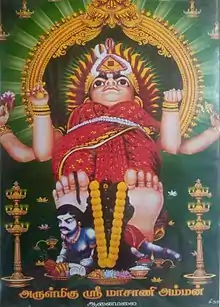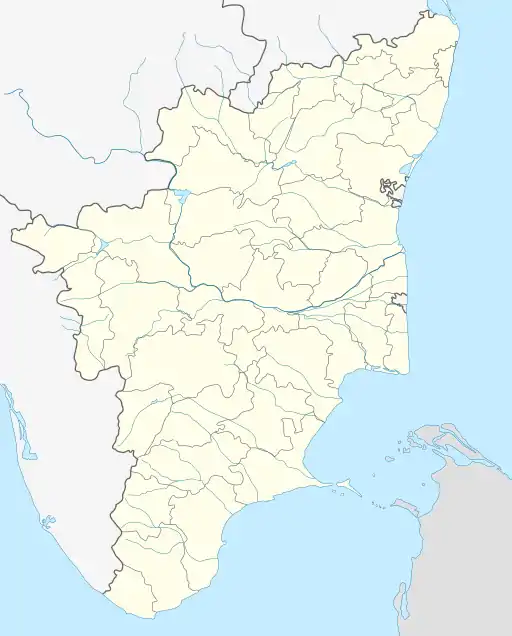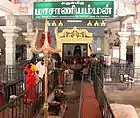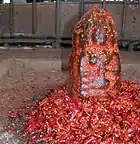Masani Amman
Masani Amman is an avatar (manifestation) of Shakti Devi. She also known as Masani Devi among north Indians. Her temple is located in Anaimalai, Pollachi, Coimbatore district of Tamil Nadu state, India.[1][2]
| Masani Amman Temple | |
|---|---|
 Masani Amman | |
| Religion | |
| Affiliation | Hinduism |
| District | Coimbatore |
| Deity | Amman |
| Location | |
| Location | Anaimalai |
| State | Tamil Nadu |
| Country | |
 Location in Tamil Nadu, India | |
| Geographic coordinates | 10.5755701°N 76.93484860000001°E |
| Architecture | |
| Type | TAMIL ARCHITECTURE |
| Website | |
| Official Website | |
Arulmigu Masani Amman Temple, also referred as Anaimalai Masani Amman Temple, is a highly revered shrine situated at Anaimalai, which is located about 24 km far south-westerly toPollachi. It is situated at the confluence of Aliyar River and the Uppar stream, nestled amid grasslands against the backdrop of mighty Anaimalai Hills. The Temple enshrines Goddess Arulmigu Masani Amman as the presiding deity. The deity is seen in a lying posture measuring 15 feet from head to foot, which is unique. Other deities worshiped in the complex include Neethi Kal (stone of justice) and Mahamuniappan. It is a popular belief here that Masani Amman will cure any illness if you go around her trident.[3][4]



History
During ancient times, Anaimalai was known as Nannur and the region was ruled by Nannuran. He had proclaimed severe punishments on those who plucked fruits from the dense mango grove that belonged to him. One day, a lady happened to consume a fruit not knowing of the strict measures. Nannuran sentences her to death despite the plea of the general public. Later, Nannuran was killed by the villagers in a battle near Vijayamangalam, and a shrine was erected to worship the lady who sacrificed her life. Since the lady was killed, the deity was called as Masani Ma means mango in Tamil .Later, the deity came to be known as Masaniamman.[5]
Pooja Times
- Opening of the Sanctum Sanctorum: 6.00am
- Anointment and adornment: 6.30am
- Noon Worship: 11.30am to 12.30pm
- Evening Worship: 6.30pm to 7.30pm
- Sannadhi Thirukappu (Closing): 8.00pm
See also
References
- "Masani Amman temple – Coimbatore". kovaizone.in.
- "Masaniamman Temple". tripadvisor.in.
- "Sri Masaniamman temple". dinamalar.com.
- "மிளகாய் அரைத்து பூசினால்... நீதி வழங்கும் மாசாணியம்மன்". oneindia.com.
- "Grind Chillies at Masani Amman Temple and Get Your Wishes Granted!". nativeplanet.com.
External links
| Wikimedia Commons has media related to Masani Amman. |
